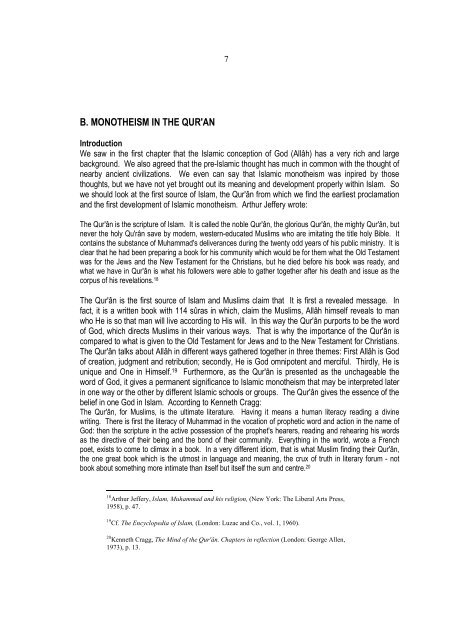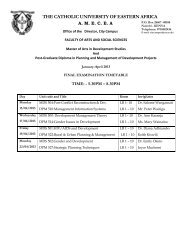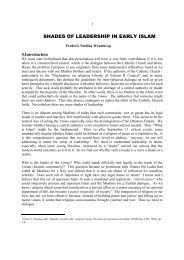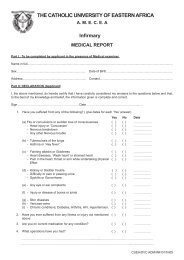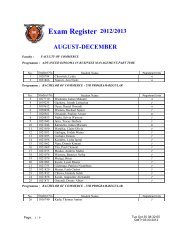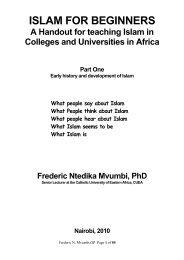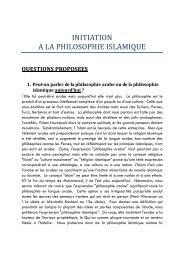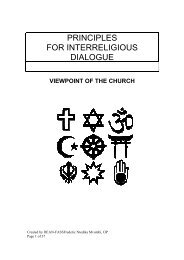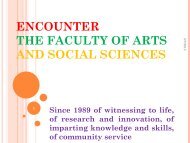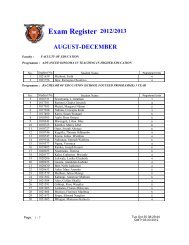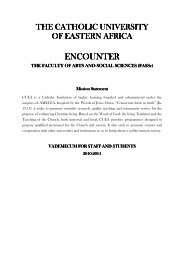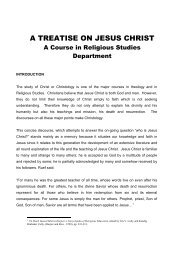INTRODUCTION TO ISLAMIC THEOLOGY.pdf - CUEA
INTRODUCTION TO ISLAMIC THEOLOGY.pdf - CUEA
INTRODUCTION TO ISLAMIC THEOLOGY.pdf - CUEA
Create successful ePaper yourself
Turn your PDF publications into a flip-book with our unique Google optimized e-Paper software.
7B. MONOTHEISM IN THE QUR'ANIntroductionWe saw in the first chapter that the Islamic conception of God (Allâh) has a very rich and largebackground. We also agreed that the pre-Islamic thought has much in common with the thought ofnearby ancient civilizations. We even can say that Islamic monotheism was inpired by thosethoughts, but we have not yet brought out its meaning and development properly within Islam. Sowe should look at the first source of Islam, the Qur'ân from which we find the earliest proclamationand the first development of Islamic monotheism. Arthur Jeffery wrote:The Qur'ân is the scripture of Islam. It is called the noble Qur'ân, the glorious Qur'ân, the mighty Qur'ân, butnever the holy Qu'rân save by modern, western-educated Muslims who are imitating the title holy Bible. Itcontains the substance of Muhammad's deliverances during the twenty odd years of his public ministry. It isclear that he had been preparing a book for his community which would be for them what the Old Testamentwas for the Jews and the New Testament for the Christians, but he died before his book was ready, andwhat we have in Qur'ân is what his followers were able to gather together after his death and issue as thecorpus of his revelations. 18The Qur'ân is the first source of Islam and Muslims claim that It is first a revealed message. Infact, it is a written book with 114 sûras in which, claim the Muslims, Allâh himself reveals to manwho He is so that man will live according to His will. In this way the Qur'ân purports to be the wordof God, which directs Muslims in their various ways. That is why the importance of the Qur'ân iscompared to what is given to the Old Testament for Jews and to the New Testament for Christians.The Qur'ân talks about Allâh in different ways gathered together in three themes: First Allâh is Godof creation, judgment and retribution; secondly, He is God omnipotent and merciful. Thirdly, He isunique and One in Himself. 19 Furthermore, as the Qur'ân is presented as the unchageable theword of God, it gives a permanent significance to Islamic monotheism that may be interpreted laterin one way or the other by different Islamic schools or groups. The Qur'ân gives the essence of thebelief in one God in Islam. According to Kenneth Cragg:The Qur'ân, for Muslims, is the ultimate literature. Having it means a human literacy reading a divinewriting. There is first the literacy of Muhammad in the vocation of prophetic word and action in the name ofGod: then the scripture in the active possession of the prophet's hearers, reading and rehearing his wordsas the directive of their being and the bond of their community. Everything in the world, wrote a Frenchpoet, exists to come to climax in a book. In a very different idiom, that is what Muslim finding their Qur'ân,the one great book which is the utmost in language and meaning, the crux of truth in literary forum - notbook about something more intimate than itself but itself the sum and centre. 2018 Arthur Jeffery, Islam, Muhammad and his religion, (New York: The Liberal Arts Press,1958), p. 47.19 Cf. The Encyclopedia of Islam, (London: Luzac and Co., vol. 1, 1960).20 Kenneth Cragg, The Mind of the Qur'ân. Chapters in reflection (London: George Allen,1973), p. 13.


